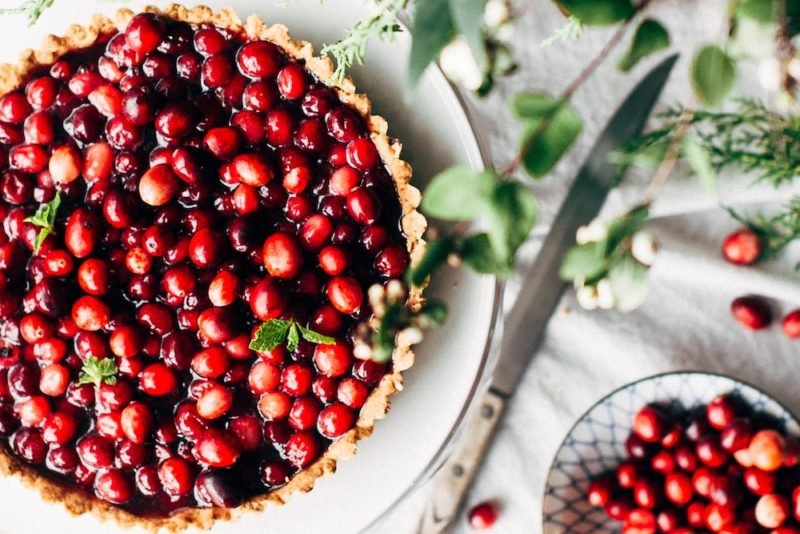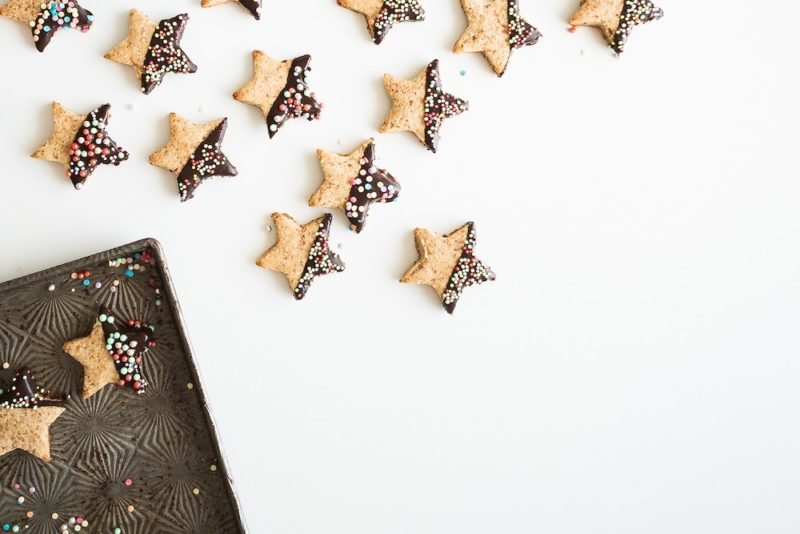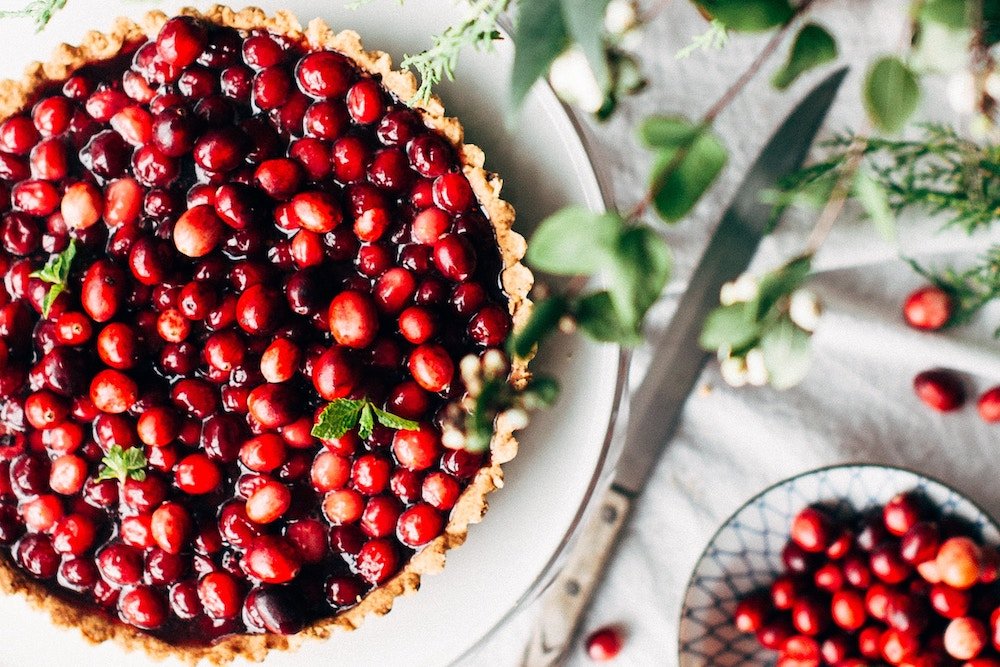Table of Contents

Once upon a time, holiday foods stood out as highlights in a year of relatively simpler fare. But in today’s food environment, with its year-round access to delicious and even indulgent foods, it’s as if the holiday season has upped the ante, which can make the holidays feel like a minefield.
As I mentioned in my previous post, the holiday food environment can feel especially daunting if you’re currently dieting or trying to practice “clean eating,” if you have a history of dieting or eating disorders, or if you struggle with emotional or stress eating. Overindulging — whether real or perceived — can lead to guilt, remorse and further overeating, which can in turn lead to greeting the New Year with a new diet, leading to a downward spiral of rules and guilt and feeling like a failure.
Beyond food rules
Looking for ways to make peace with food this season? You won’t find it in clichéd advice to “Fill up on raw vegetables without dip instead of eating the other appetizers” or “Eat before the party so you aren’t hungry and tempted to eat AT the party.” This kind of advice can backfire in a big way, because, again, denying yourself access to favorite foods can lead to eating to the point of discomfort, or even to actual binging.
Some saner advice is to turn to mindful and intuitive eating, which can help you avoid the “anything and everything goes” mentality — along with the pendulum swing from restriction to excess — by guiding you to choose foods you truly want and leave the rest, ultimately increasing satisfaction.
One small caveat is that the holidays can be a more challenging time to start practicing mindful and intuitive eating, because more things are competing for your attention, and feeling rushed and stressed makes it harder to pause and notice internal cues. That said, sometimes there’s no time like the present.

Permission to eat
If you are used to denying yourself favorite foods — or eating them then feeling guilty about it — one way to pull free of the restriction-overeating cycle is to give yourself permission to mindfully eat holiday favorites. This can take the power back from the food.
What do I mean by power? When you declare favorite holiday foods “off limits,” it strengthens their allure. (Hello, forbidden fruit.) When you DO eventually give in to food you’ve labeled as “forbidden” or “bad” or “unhealthy,” odds are you won’t be able to just enjoy one serving — if you think you will never eat this food again, this can trigger a Last Supper mindset, leading to eating to uncomfortable fullness. This is often followed by guilt, and even shame, which themselves can be powerful triggers for overeating.
If you’ve already been cultivating mindful and intuitive eating habits, keep in mind that anxiety around the holidays can make it tempting to create new food rules to try to manage that anxiety — a strategy that also tends to backfire. Trying to adhere to a lot of food rules creates tension, which almost always leads to “Oh, heck with it” eating to temporarily ease that tension.
Increasing satisfaction and food pleasure
Intuitive eating actually helps you enjoy food more in a balanced way, not in a free-for-all way. In fact, the best way to enjoy food during the holidays is to not restrict or deprive. Why? Because if you get into the “I better eat it now because I won’t have it later” mode, you don’t fully enjoy it…and who doesn’t want to enjoy food more?
Maximizing enjoyment includes choosing foods that taste good and feel good to the body. It can be helpful to take a moment to reflect on your favorite foods during the holidays, and make room for those foods. Alternatively, you might decide to consider which dishes will taste the best at each event, and make room for those — remembering that some dishes look better than they taste.
Indeed, you might find that maximizing enjoyment and satisfaction is a better motivator than any “should.” This can actually make the holidays a good time to practice intuitive and eating skills because there are so many opportunities to enjoy foods you love. Why bother with store bought cookies or dried-out fudge when delicious food is abundant? If you’re going to be choosy, do it in a mindful way, not a rules-based way.

Honoring hunger
Part of satisfaction stems from being hungry — because it helps food tastes better — but not TOO hungry. Honoring hunger is a core principle of intuitive eating, and staying nourished throughout the day is essential, because if you are ravenously hungry when you walk into a party or other holiday event, you are not going to fully enjoy the food!
Have you ever tried to compensate for special holiday meals or treats by skipping lunch or dinner, only to arrive at a party too hungry? Odds are you found that the combination of primal hunger + delicious holiday food = overeating…and maybe not even really tasting that delicious food.
Chaotic, over-scheduled days (common around the holidays) can lead to chaotic eating, skipped meals, and possibly overeating due to the ensuing ravenous, even primal hunger. This means that scheduling regular meals and snacks to avoid long gaps without eating is important for self-care. On the surface this may not feel intuitive, but the reality is that it’s harder to notice subtle hunger and fullness cues if you’re over-scheduled and stressed.
Self-care and coping mechanisms
Another reason that self-care is so vital is that it’s easier to eat intuitively and mindfully when your inner house is in order. The holiday season is supposed to be joyful, but there are many stressors and emotional triggers that can cause even experienced intuitive eaters to struggle. As I also mentioned in my previous post, this makes now a good time to take stock of your emotional coping mechanisms, so food isn’t the sole focus of how you are going to get through the holidays.
Take time to engage in some physical activities that you enjoy — indoors, if you just can’t bear the weather — and get enough sleep. Sleep deprivation interferes with hunger and fullness cues.
That said, fitting self-care into an already packed day can feel…stressful. If this rings true with you, put practicality ahead of perfectionism. Ask yourself, “What are the minimum self-care requirements to keep my sanity?” Come up with your top few self-care priorities, and try to include some form of stillness — whether that’s journaling, taking a bath, spending some time in nature, meditation or just sitting and reading a book while listening to favorite music. When many things are competing for your attention, prioritizing some stillness can help you stay connected to yourself and your body’s needs. That’s especially true if you tend to be an introvert who likes their alone time! (Raising my hand on that one!)

Setting boundaries and setting the stage
Permission to eat and tuning in to physical and emotional sensations during and after eating are two intuitive eating principles that go hand-in-hand. Instead of trying to follow predetermined diet rules, eat with intention and awareness. Set your intention to feel better when you are done eating than you did when you started, then eat with awareness of your food and your body.
To help put this into practice, it can help to mentally rehearse for challenging food-related scenarios. I really can’t encourage this enough! Ask yourself “How would I like to enjoy this meal/this party/the holidays?” Next, walk yourself mentally through a food-related holiday event. Imagine yourself enjoying food and stepping away from the meal or party not being stuffed. Then, imagine how it would feel to be stuffed. Which way do you want to feel?
This sort of rehearsal is also helpful for dealing with food pushers, which can be a holiday trouble zone even for practiced intuitive and mindful eaters. As Evelyn Tribole, co-author of “Intuitive Eating,” often points out, “It is not your responsibility to make someone happy by overeating, even if it took hours to prepare a specialty holiday dish. You may need to practice politely saying, ‘No thank you.’”
Using the holidays as a launchpad
When you practice setting boundaries, prioritizing self-care and making room for favorite foods during the holidays, this can help set the stage for further cultivating intuitive eating skills after the holidays. Once you start, don’t stop — keep the ball rolling!
Related posts
Carrie Dennett, MPH, RDN, is a Pacific Northwest-based registered dietitian nutritionist, freelance writer, intuitive eating counselor, author, and speaker. Her superpowers include busting nutrition myths and empowering women to feel better in their bodies and make food choices that support pleasure, nutrition and health. This post is for informational purposes only and does not constitute individualized nutrition or medical advice.
Seeking 1-on-1 nutrition counseling? Carrie offers a 6-month Food & Body program (intuitive eating, body image, mindfulness, self-compassion) and a 4-month IBS management program (low-FODMAP diet coaching with an emphasis on increasing food freedom). Visit the links to learn more and book a free intro call to see if the program is a good fit, and if we’re a good fit!
 Print This Post
Print This Post





More Stories
United Healthcare’s ransomware attack shows why supply chains are under siege
Nutrition Tips For Ramadan | JM Nutrition
Probiotics for IBS | The Nutritionist Reviews